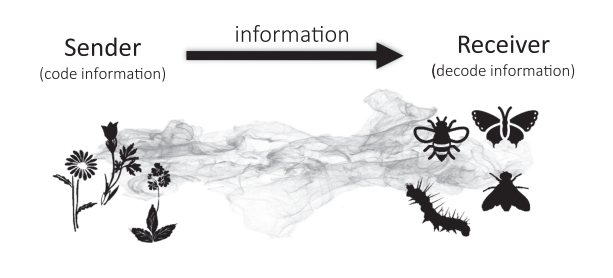Cross-species communication, where signals are sent by one species and perceived by others, is one of the most intriguing types of communication that functionally links different species to form complex ecological networks. Global change and human activity can affect communication by increasing fluctuations in species composition and phenology, altering signal profiles and intensity, and introducing noise. So far, most studies on cross-species communication have focused on a few specific species isolated from ecological communities. Scaling up investigations of cross-species
communication to the community level is currently hampered by a lack of conceptual and practical methodologies. Here, we propose an interdisciplinary framework based on information theory to investigate mechanisms shaping cross-species communication at the community level. We use plants and insects, the cornerstones of most ecosystems, as a showcase; and focus on chemical communication as the key communication channel. We first introduce some basic concepts of information theory, then we illustrate information patterns in plant-insect chemical communication, followed by a further exploration of how to integrate information theory into ecological and evolutionary processes to form testable mechanistic hypotheses. We conclude by highlighting the importance of community-level information as a means to better understand the maintenance and workings of ecological systems, especially during rapid global change.
Authors: Zu, Pengjuan; García‐García, Reinaldo; Schuman, Meredith Christine; Saavedra, Serguei & Melián, Carlos J
Contact address: pengjuan.zu@gmail.com
Institution: University of Zurich, Switzerland
Twitter name of the institution: @UZH_en
Twitter link: https://twitter.com/UZH_en
Available downloads:
Plant‐insect chemical communication in ecological communities: an information theory perspective


